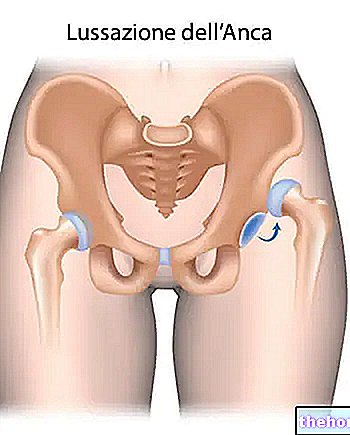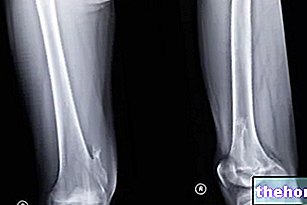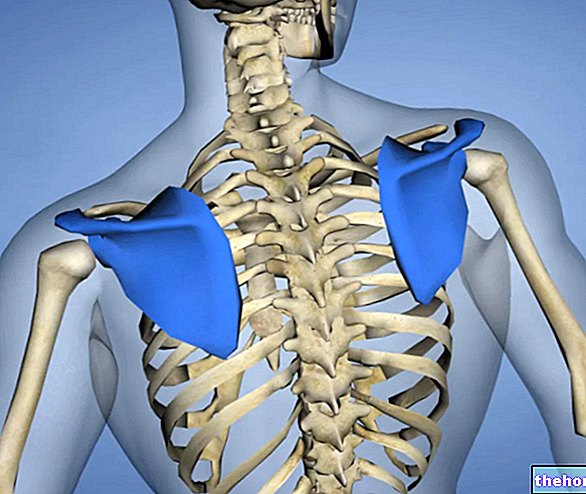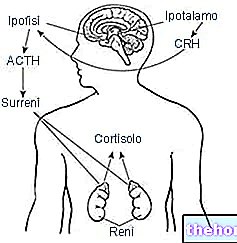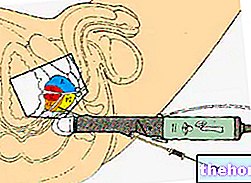Generality
From a medical point of view, "head trauma" is defined as any damage to the skull and / or to the brain and its envelopes caused by a physical event of a mechanical type (such as, for example, a fall in which the head to the ground).

For this reason, in case of head trauma, it would always be advisable to contact your doctor.
Causes
As mentioned, head trauma is damage to the skull and its contents, caused by a physical event of a mechanical nature.
More precisely, we can say that head trauma can be caused by:
- A closed head injury, when the head violently hits an object, as can occur in the event of falls, traffic accidents, violent fights, sports injuries, etc.
- A penetrating injury to the head, when the head hits, or is violently struck by, an object that is able to penetrate it (such as, for example, bone fragments or bullets).
Classification
A first classification, which can be made to distinguish the different types of head trauma, takes into consideration the severity of the damage suffered. In this case, therefore, we will distinguish:
- Mild head injuries;
- Moderate or severe head injuries.
As you can easily imagine, mild head injuries are inherently less dangerous than moderate or severe ones and have a better prognosis; however, they should not be underestimated anyway.
Another subdivision can be made according to the area affected by the damage. In this regard, we can distinguish:
- Focal head injury, when damage affects only one particular area of the brain;
- Diffuse head trauma, when damage affects multiple brain areas.
Of course, the symptoms can vary both according to the severity of the damage and according to the affected area.
Symptoms and Complications
As mentioned, the symptoms of head trauma can be different depending on the extent of the damage and depending on the brain area - or brain areas - affected by the latter.
Additionally, some symptoms appear shortly after damage has occurred, while still others can take hours, days, or even weeks to manifest.
In any case, among the main symptoms that can occur in the case of mild head injury, we remember:
- Loss of consciousness of short duration (a few seconds or a few minutes); however, it should be noted that this symptom does not always manifest itself;
- Mild mental confusion (see also concussion);
- Headache
- Dizziness
- Neck pain;
- Visual disturbances (diplopia, feeling of tired eyes, etc.);
- Tinnitus;
- Daytime sleepiness, lethargy and fatigue;
- Difficulty concentrating.
In the case of moderate or severe head trauma, however, the symptoms just mentioned can manifest themselves in a more marked and intense way. More specifically, the following may arise:
- Loss of consciousness with inability to awaken;
- Persistent headache that gets worse over time
- Focal neurological deficits;
- Repeated vomiting
- Changes in personality;
- Confusion and agitation;
- Mydriasis or paralysis of the pupils;
- Difficulty communicating
- Disorders of coordination.
In addition, in the long term they could manifest:
- Amnesia;
- Behavioral disturbances;
- Sleep disorders;
- Alteration of the intellectual faculties.
Symptoms related to head trauma may, depending on the case, regress, remain unchanged, or worsen.
When Call the doctor
It being understood that in case of head trauma it is always good to contact your doctor or the nearest hospital center, this behavior becomes mandatory when the symptoms appearing as a result of the damage tend to worsen. In fact, a worsening of the symptoms head trauma could indicate the presence of deeper lesions or complications, such as, for example, cerebral edema or intracranial hemorrhages.
Other complications that can arise in patients with head trauma are:
- Seizures;
- Ischemic stroke;
- Hemorrhagic stroke;
- Hydrocephalus.
Diagnosis
In addition to the evaluation of symptoms, to confirm the diagnosis of head injury and identify any brain lesions, the doctor may use instrumental investigations such as CT or MRI.
The CT scan is usually able to identify any skull fractures with greater accuracy than other techniques, as well as providing indications on the presence of hemorrhages or hematomas; while the magnetic resonance allows the more precise and detailed identification of possible brain lesions.
Radiography, on the other hand, in the majority of cases of head trauma turns out to be completely useless. Eventually, X-rays can be useful to identify the presence of fractures in other areas of the body, which may have been caused by the fall or by the accident that gave rise to the head injury.
In case of suspected or confirmed brain damage, the doctor may decide to hospitalize the patient.
Treatment
The treatment of head trauma is closely related to the extent of the damage suffered by the patient.
If the head injury is mild and the patient has a family member or in any case people who can watch over him and keep him under control to detect the appearance of further symptoms, then the doctor may decide not to hospitalize him.
If, on the other hand, the head injury is moderate or severe and is associated with brain injury, of course, the doctor will immediately arrange for the patient to be hospitalized.



